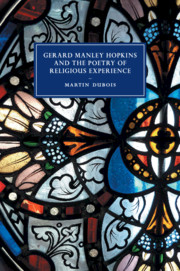'Diverse, generous, flexible, contingent. After reading this book, I believe these words best express both the version of Hopkins it offers and the nature of its author's unique critical approach … Along with his excellent argumentation and thorough grounding in biographical research and religious history, Dubois displays an intimate knowledge of the poems and a fine ear for their idiosyncrasies.'
Summer J. Star
Source: Review 19
'Dubois’s study is a rigorous and scholarly investigation which highlights the close dependence of Hopkins’s work on elements of contemporary Catholic religious practice.’
Joseph Phelan
Source: The Times Literary Supplement
'Martin Dubois’ brilliantly simple project in Gerard Manley Hopkins and the Poetry of Religious Experience is to restore this recognition of the essential variety or ‘mixed insight’ of Hopkins’ thought to our understanding of his theological and spiritual awareness … Dubois demonstrates how these various contexts of religious experience were further variegated by a number of persistent cross-pressures in Hopkins’ theological thinking, charting them along a number of axes … [A] compelling account of the varieties of religious experience in Hopkins’ verse …'
A. J. Nickerson
Source: The Cambridge Quarterly
‘The approach is flexible, skilful, believable, and helpful … Dubois’ acute appreciation of the rhythm and music of Hopkins’ lines as the patterns of sound shift and create different effects is an additional pleasure in experiencing these poems … It is a pleasure to read a scholarly work that is so in harmony with its subject, not bogged down in theory but adept at offering balanced readings and giving a host of other interpretations an opportunity to be heard.’
James Finn Cotter
Source: Hopkins Quarterly
‘[A] fine, detailed, and extremely thoughtful study.’
Adrian Grafe
Source: Victorian Poetry
'Through close readings of poems like 'The Wreck of the Deutschland', 'Spelt from Sybil’s Leaves' and 'That Nature is a Heraclitean Fire and of the Comfort of the Resurrection', and with a keen ear for prosody capable of handling the linguistic daring of Hopkins, Dubois insightfully unpacks the theological narrowness of Hopkins’s notion of a final judgement and its contrast with the beauty and dignity of natural and human life that his best-loved poems celebrate.'
Sean Sheehan
Source: Dublin Review of Books
'Although his aim is to illuminate complexity, Dubois argues his claims with admirable clarity. … [Dubois] invites Hopkins scholars to understand the man’s work more inclusively and with a more attentive eye to the ‘spiritual as well as … linguistic importance’ of his poetic choices. It is a compelling invitation.'
Sarah Weaver
Source: Victoriographies
'Throughout the book, the fluency and depth of Dubois’s readings impress, steeped as they are in painstaking research and close readings of lapidary detail. The precision and particularity of Dubois’s attention echo those of the poems themselves and fittingly unveil the ‘piedness’ of Hopkins’s poetic vision. … [Dubois] demonstrates most profoundly the density and intricacy inherent in Hopkins’s religious works.’
Amanda Paxton
Source: Modern Language Review
‘… a clear-sighted and necessary study … It brings forward and gives due consideration to unjustly neglected and occasionally maligned texts, as well as mobilizes insightful new readings of the canonical poetry … This poised and unconstraining study of Hopkins's religious experience, of ‘the miscellaneousness of his lived experience,’ offers a strong fillip for Hopkins studies, a standard and stimulus for further scholarship.’
Daniel Brown
Source: Victorian Studies
‘… deeply scholarly and at the same time absorbingly readable …’
Jean Ward
Source: The Heythrop Journal



